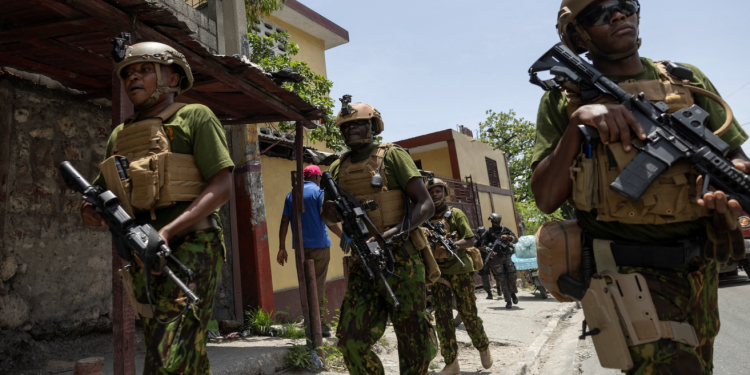The United Nations (UN) has stated that the Kenya-led mission to rid Haiti’s capital of criminal gangs is likely to suffer deeper financial shortages as a result of President Donald Trump’s suspension of foreign aid.
- The international body said that the suspension would block the provision of pending aid worth US$13.3 million (KSh 1.7 billion) to support Kenyan police officers in combating the gangs.
- The UN Security Council approved the mission to restore order in Haiti in October 2023, with the US committing US$15 million to the trust fund.
- The freeze is part of President Trump’s 90-day suspension of foreign aid, which his administration said is meant to provide time to “review those programs.”
“We received an official notification from the US asking for an immediate stop work order on their contribution to the trust fund for the Multinational Security Support (MSS) mission,” UN Secretary General’s spokesperson, Stephane Dujarric, said.
The mission in Haiti has been underfunded and under equipped, affecting more than 600 Kenyan police officers tasked with retaking the capital from gangs. El Salvador, Jamaica, Guatemala, and Belize have contributed some personnel to the effort, but the combined force is still significantly short of the target 2500 personnel required.
Former President Joe Biden’s administration, which pushed for the mission, had matched the US$15mn into the UN fund with US$300mn in funds and support to the Kenya-led force. With the current freeze, police advisers from the US and Canada begun withdrawing from Haiti late last week, and the mission’s overall success is now in limbo.
What Next?
The mission will now have rely heavily on other partners and funders, especially Canada’s US$63 million contribution to the fund. Recently, the National Treasury reported that Kenya spent about KSh 2 billion to support the mission awaiting reimbursement from the UN. The announcement came after allegations that Kenyan police officers in the mission had their salaries delayed by 3 months.
The government, through the Principal Secretary Korir Sing’oei said that the money spent from the exchequer will be refunded. It argued that the same thing happened during Kenya’s intervention in the Eastern DRC, where taxpayers’ money spent in the effort was reimbursed by the African Union (AU). This might now be hampered by reduced financing, and the lack of clarity on whether the US, which pushed for the mission, will resume funding or push for the mission to be converted into a formal UN peacekeeping force.
The Haiti mission remains controversial, facing widespread opposition from civil society and many Haitian expatriates who perceive it as a hypocritical exercise with little sight of progress. With the temporary exit of the US, the mission could face a broader financial shortfall – which may have to be bankrolled by the Kenyan taxpayer in the short-term.




